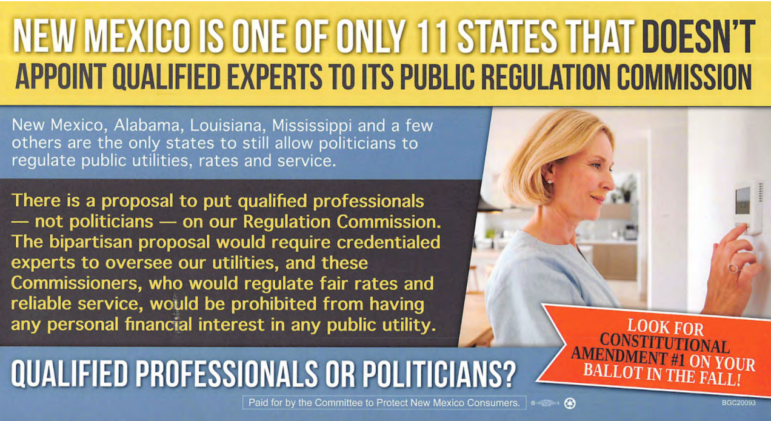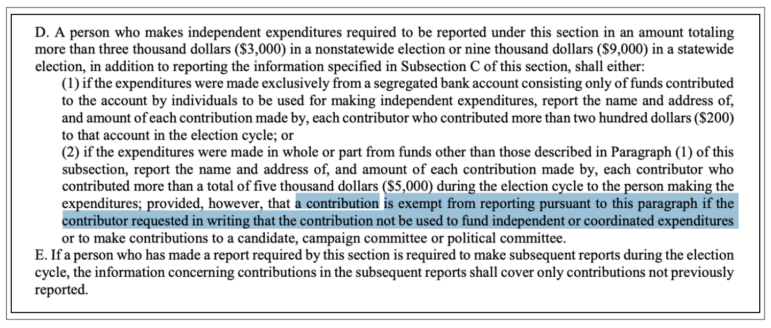After a decade-long effort, New Mexico lawmakers passed new campaign reporting requirements in 2019 to force nonprofit groups, which can spend money on political campaigns without registering as political committees, to disclose their spending as well as the names, addresses, and contribution amounts of their donors who fund such “independent expenditures.”
Outside campaign spending by groups or individuals not affiliated with a particular campaign have long been a target of reformers seeking to rein in the influence of money on politics. Without disclosure, nonprofits can spend unlimited amounts of “dark money” without the public knowing where the money comes from.
This story was written for New Mexico In Depth and is republished here with permission through a Creative Commons license.
In 2020, two nonprofit groups immediately put the new law to the test by refusing to disclose donors despite enforcement efforts by both the Secretary of State and the New Mexico State Ethics Commission.
“I’m not at all surprised,” said Sen. Majority Leader Peter Wirth, D-Santa Fe, who championed the transparency measure for a decade. “Anytime you’re trying to rein [dark money] in, you know, there’s going to be groups that are going to push the limits.”
The challenges by the nonprofit groups represent a key test for both the law itself and for the enforcing power of the state’s newly created ethics commission, also established in 2019 after several decades of ongoing debate and setbacks.
Approved by voters and given powers by the Legislature, the commission can subpoena records and enforce state statutes that cover campaign spending, lobbying, and government conduct. “They are a set of statutes that protect representative democracy,” said Jeremy Farris, the commission’s executive director.
The two groups are demonstrating the challenges that confront the new agency.
One group has disclosed its expenses — but not its donors — after settling with the State Ethics Commission following the agency’s conclusion that the group’s activities were political. The group argued that contributors asked in writing that the funds not be spent on political advocacy, and in the statute such written requests make the contributions exempt from disclosure regardless of how the funds are actually spent.
In the other case, the group has taken aim at the definition of “contribution” in the state statute, arguing that since none of its donors were solicited specifically for political activities, their donations don’t count as political contributions even if the money was later used for political campaigning.
On Dec. 14, the State Ethics Commission announced it had filed a lawsuit against that second group — the Council for a Competitive New Mexico — in New Mexico’s 2nd Judicial District Court. The commission is seeking to force the group to register as a political committee, disclose its donors, and pay fines for its prior refusal to disclose.
The Committee to Protect New Mexico Consumers
In August, the Committee to Protect New Mexico Consumers (CPNMC) spent over $260,000 on mailers to New Mexico voters about constitutional amendment 1, which would make the state’s Public Regulation Commission an appointed rather than elected body. Voters approved the measure in November.

The group claims the purpose of the mailers was merely to educate voters.
“501(c)(4) organizations such as the Committee to Protect New Mexico Consumers (CPNMC) are allowed to do educational outreach and communication,” the group’s treasurer, Noah Long, wrote in an email, maintaining the mailers weren’t political.
But Farris disagrees.
“As we looked at these four mailers, we thought that there was no other reasonable interpretation other than as an appeal to vote for that ballot question,” said Farris.
In September, the commission authorized staff to send the group a letter demanding they comply with the new reporting requirements.
Ultimately, CPNMC settled with the commission, agreeing to disclose how it spent the money but continuing to hide its donors.
An exemption in the law gives groups the opportunity to claim that they don’t have to disclose donors who request in writing their donations not be used for political purposes. The group invoked that language to claim its donors had requested that their money not be used for political purposes, shielding them from the new law even if the mailers were found to be political.

“If that request in writing is made, then the identity of the contributor is not subject to disclosure under the law,” said Farris. “It’s a proviso clause that enables contributors to get out of disclosure requirements when the purpose of the statute is to provide for disclosure.”
In a press release, the commission explained that the settlement led to important disclosure about the group’s spending before election day.
On the same day that CPNMC agreed to file an independent expenditure report, Long created a PAC called “Vote Yes to Reform the New Mexico PRC.” It has disclosed almost $750,000 in contributions from a handful of mostly opaque sources, including other political nonprofits like America Votes and the League of Conservation Voters, demonstrating yet another challenge to tracking money in politics, known as gray money.
The Council for a Competitive New Mexico
Meanwhile, last May a nonprofit called the Council for a Competitive New Mexico (CCNM) reported spending over $130,000 on mailers and robo-calls to voters in the lead up to the June primary election. The spending paid for negative attacks on several Democratic candidates who were challenging more conservative incumbent Democratic state senators. While the group filed a report describing its spending, it didn’t disclose who funded the efforts.
Following an ethics complaint against CCNM in August and a lack of response by representatives of the nonprofit, the Secretary of State’s office gave the group 10 working days to voluntarily disclose its donors or face penalties and fines.
Enter Charles Spies, a D.C.-based lawyer who serves as legal counsel for CCNM with a background in national Republican politics. A proponent of outside spending by super PACs, he was once quoted as saying “as long as we have a Constitution, outside money’s not going anyplace.” In both 2012 and 2016, Spies helped establish super-PACs supporting Republican presidential candidates Mitt Romney and Jeb Bush.
Spies sent a letter to the Secretary of State’s office on October 2nd arguing that the nonprofit was not required to disclose its donors because no money had been solicited to fund independent expenditures.
Arguing that the term “contribution” in the state’s campaign reporting act applies only to donations explicitly made for political purposes, the letter describes a series of “oral solicitations” made in March of 2020 in which a “broad group of tools” including “policy research and advocacy, issue advocacy, and independent expenditures” were presented.
“Well after donations were received, the CCNM team determined that part of its strategy to achieve its policy goals would be to make certain independent expenditures,” reads the letter.
Correspondence between the group and state authorities reveal the involvement of several prominent local figures.
Doug Turner, CEO of the public relations firm Agenda and a former Republican candidate for governor, served as a strategic communications consultant for the group. Local commercial real estate developer Adam Silverman is listed as the group’s secretary, while Laura Sanchez-Rivet, chief of staff of public policy at PNM Resources, Inc, served as the group’s legal counsel. Lobbyist Chevonne Alarid is listed as the nonprofit’s president.
In an interview, Turner said that he made a series of five to 20-minute phone calls soliciting donations over a period of roughly two weeks. Turner insisted that the group maintains broader policy goals, pointing to a digital ad campaign emphasizing the importance of safe voting during the pandemic. But Turner denied knowledge or involvement with the outside spending in June’s Democratic primary, despite his role overseeing strategic communications.
Sanchez-Rivet did not respond to New Mexico In Depth requests for an interview. Charles Spies wrote in an email that, “CCNM has complied with New Mexico law and its filings with the Secretary of State speak for themselves in answering your questions.”
Following Spies’ letter, the Secretary of State’s office referred the case to the State Ethics Commission, stating that it was “unable to conclusively determine that a violation has occurred.” On December 4th, the State Ethics Commission unanimously voted to authorize its staff to send a demand letter to CCNM enforcing the state’s campaign finance law, giving the group until Thursday, December 10th to respond.
State Ethics Commission files suit
Despite the ethics commission’s demand letter, the Council for a Competitive New Mexico continued to refuse to disclose its donors.
“Their response was brief, and more or less followed the lines of how they responded to the Secretary of State’s office — that their contributions weren’t received for a political purpose,” said Farris.
As a result, Jeremy Farris and Walker Boyd, the commission’s legal counsel, filed a civil complaint on behalf of the commission in New Mexico’s 2nd Judicial District court in Albuquerque. The complaint asks that the Council for a Competitive New Mexico be declared a “political committee” in order to enforce disclosure of the group’s donors. The civil complaint alleges that despite CCNM’s arguments to the contrary, the “primary purpose” of CCNM was to make independent expenditures, meaning more than 50% of either time or money was spent on political activity. It also asks the court to find that contributions to CCNM were political, and that the campaign reporting act compels the group to disclose its spending on its independent expenditures.
Additionally, the complaint asks that CCNM be penalized for its prior refusal to comply, fines that could add up to $20,000.
Ultimately, the strength of New Mexico’s laws on outside spending hang in the balance. If CCNM’s challenge to the disclosure law is allowed to stand, other groups might use the same arguments put forward by Charles Spies to shield donors from public disclosure in the future.
Clarifying campaign laws in 2021 may be risky
Upon settling with CPNMC, Farris said in a press release that the ethics commission looked forward to working with the Legislature to close the loophole that “allows donors behind independent expenditures to remain anonymous by making a pro–forma request that their contributions not be used to fund independent expenditures.”
But concerns about the mostly virtual nature of the upcoming legislative session due to the COVID-19 pandemic have given the commission and some reformers pause.
“The upcoming session might not be the session to get into the disclosure provisions of the Campaign Reporting Act,” said Farris. Because the law is “tightly-knitted,” he said, one change can lead to unintended consequences. Amendments require “a lot of public attention and focus,” he said, “and I think there are concerns that it would be harder to achieve that in a largely virtual session.”
Other reform advocates, including Common Cause New Mexico, have gone even further.
“We are very concerned that if these statutes were opened up for amendment during a session in which full public participation and expert input was not available, the outcome might well be unfortunate,” the organization said in public comments submitted to the state ethics commission.
“It is such a tightly woven sweater,” said Heather Ferguson, executive director of Common Cause New Mexico. “All they have to do is pull one thread and change one term, and that can create loopholes the size of a Winnebago.”
Making such amendments in a way that allows for “thoughtful and deliberative” public participation would be challenging during a remote session, Ferguson said.
But in an interview, Wirth, the Senate majority leader who championed the 2019 law, sounded more upbeat about the public being able to effectively participate. While the public likely won’t be allowed to enter the Roundhouse, he expects much more access online than in years past.
“With respect to campaign finance, and ethics issues, I think you’re going to see bills, and I certainly will encourage everyone to participate, and to do so via the virtual process that’s going to be available,” said the Santa Fe Democrat. “I do think that having committee hearings online will open up the process in a way that it hasn’t been before.”
“If we need to fix this, this is the window to do it,” he said.
“We’re headed right back into another election cycle, and what we’ve learned is that trying to wait for a 30 day session is really tough, because people are already campaigning under a set of rules.”
He also noted the change in the composition of the Senate.
“It’s going to be a very different Senate than it’s been,” said Wirth. “We have seven new members on the Democratic side and four new members on the Republican side. So more than 25% new members.”
As for the ethics commission, Farris said it won’t put forward a bill to change the campaign reporting act this year. The agency will instead issue recommendations that the commission would support, including the use of a separate bank account for contributions whose donors have made requests that they not be used for outside spending.
“The idea with this particular recommendation is to try to ensure that such contributions can’t be used for independent or coordinated expenditures by requiring that they be placed in a segregated bank account.”






















